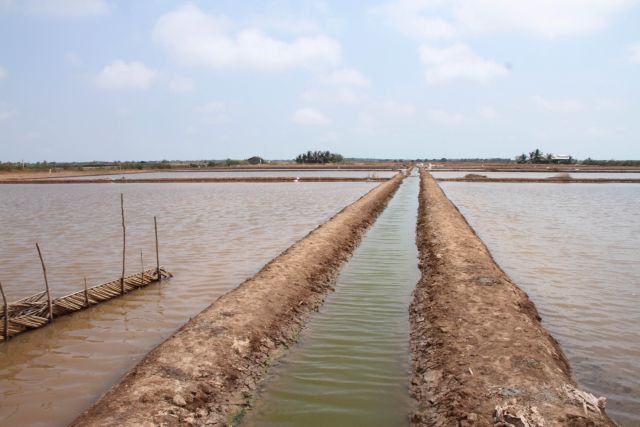 Economy
Economy

The Cửu Long (Mekong) Delta province of Bạc Liêu is seeking to develop its collective economy, especially co-operatives that use advanced technologies, from now through 2025.

|
| Artemia breeding ponds in Bạc Liêu Province’s Hoà Bình District. Bạc Liêu is speeding up the development of co-operatives, especially agriculture. — VNA/VNS Photo Chanh Đa |
BẠC LIÊU — The Cửu Long (Mekong) Delta province of Bạc Liêu is seeking to develop its collective economy, especially co-operatives that use advanced technologies, from now through 2025.
It will focus on agriculture, seafood, salt production, industry including small businesses, construction, transport, trading, and services.
It plans to establish 140 new co-operatives, 105 in agriculture, by 2025.
It will encourage co-operative groups that operate efficiently to develop into co-operatives. Under the 2012 Co-operative Law, a co-operative group has at least three members and a co-operative, at least seven.
To achieve the targets, the province will take measures like boosting advocacy about the law and implementing it, improving the operations of collective economy units and mobilising investments from various sources to enhance their efficiency.
It will have preferential policies to get outstanding university graduates and young scientists to manage co-operatives, encourage research into advanced techniques for developing the collective economy and prioritise soft loans for co-operatives to acquire them.
It will focus on developing brand names for co-operatives to increase their competitiveness, and organise trade promotion activities at home and abroad to popularise them.
It will create conditions for co-operatives and co-operative groups to exchange experiences and link up with companies to develop value chains.
It will prioritise creation of infrastructure for transport, power and water and irrigation to enable development of the collective economy.
The province has 170 co-operatives, but a majority have little capacity in terms of finance, competitiveness and management, and face difficulties in adopting advanced techniques and seeking outlets for their products, according to its Co-operative Alliance.
It said co-operation between members of a co-operative, between co-operatives and between co-operatives and companies have not been implemented efficiently.
With the number of co-operative managers who have a college or university degree only meeting 79 per cent of target, most lack the skills needed for managing and organising the operation of co-operatives, it added.
Nguyễn Văn Vũ, its chairman, said the alliance would work with local authorities to improve the quality of management and instruct co-operatives in linking up with companies.
Under the national target programme for building new-style rural areas, the province’s co-operatives, especially agricultural co-operatives, have got more support in recent years.
“Co-operatives can easily access loans from the province’s Co-operative Development Fund,” Vũ said.
The fund provided loans worth a total of VNĐ6.3 billion (US$273,000) to nine co-operatives last year and would provide VNĐ19 billion ($821,000) to 26 others this year, he said.
The alliance has identified some efficient co-operatives for further development, and they will get priority in promoting their products, building brands and getting soft loans.
The Vĩnh Châu Artemia Co-operative in Bạc Liêu City’s Vĩnh Trạch Đông Commune is one of those selected.
With support from the alliance and local authorities, it breeds artemia, also known as brine shrimp, for harvesting its eggs.
When artemia eggs are harvested and processed, they can be stored for a very long time. When the eggs are provided sufficient conditions, they will hatch into nauplii, which are used as food for fish and shrimp larvae and have high nutritional value.
The co-operative exports its artemia eggs to many markets, including the US and the EU, and has annual revenues of VNĐ20 billion ($865,000). VNS




